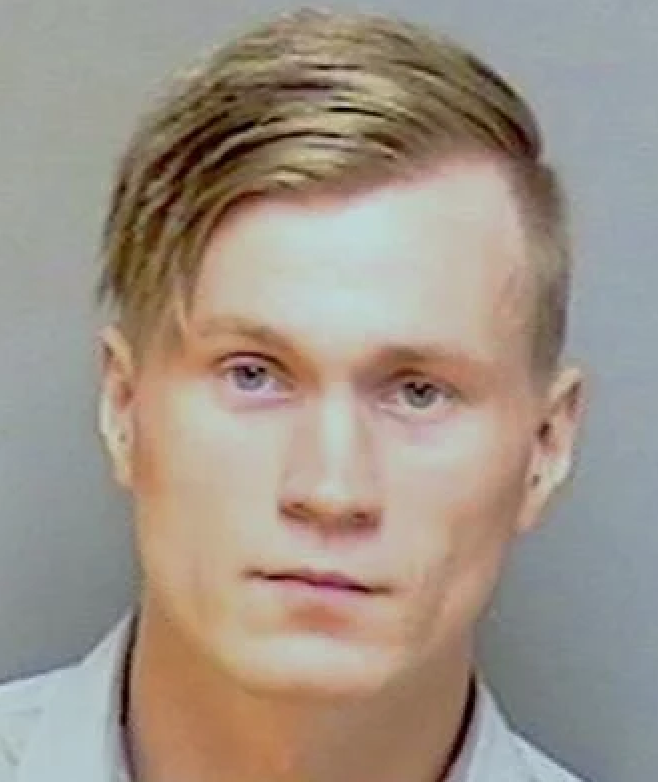After almost seven years of waiting, 14 months of preparation and legal wrangling, and three days of trial before the Albemarle County Circuit Court for Jacob Joseph Dix, Judge H. Thomas Padrick Jr. declared a mistrial Friday, June 7, after the jury spent 12 hours over two days deliberating, only to find themselves hopelessly deadlocked.
Dix, 29, of Clarksville, Ohio, was charged with burning an object to intimidate, a class 6 felony, for his participation in the infamous torch rally on UVA Grounds in 2017.
The trial was what is known as a case of “first impression,” when a law or legal interpretation is challenged in court for the first time. As Dix’s case was the first time Virginia Code “§ 18.2-423.01. Burning object on property of another or a highway or other public place with intent to intimidate” would be tried in a court of law, in dispute was the definition of “burning an object.” It was a legal quandary predicted by former Commonwealth’s Attorney Robert Tracci in a September 2019 opinion piece for C-VILLE Weekly:
“The statute refers to ‘[burning] an object.’ The question could arise—and would in criminal law—as to whether carrying a burning torch falls within the definitional scope of burning an object. That alone could prevent a prosecution. While this memorandum distinguished the May and October torch-lit rallies from the August 11, 2017, events on UVA Grounds, the ‘threshold problem’ conforming a tiki torch to the burning objects statute presents in all three rallies.”
The aforementioned statute was itself codified as a replacement to a Jim Crow-era law banning the burning of crosses, which was struck down by the U.S. Supreme Court. Codified in 1950, it was intended to help prosecute Ku Klux Klan members for racial violence. In the ruling that struck the law from the books, Supreme Court Justice Sandra Day O’Connor took issue with the part of the Virginia statute that allowed a jury to infer the intent of the accused.
Then-candidate for Albemarle County Commonwealth’s Attorney James Hingeley criticized Tracci’s interpretation of the law and subsequent refusal to charge anyone with the torch rally. On the campaign trail in 2019, CNN quoted him mentioning the untested burning to intimidate statute explicitly:
“There are so many people in our community … who were there on August 11 who were terrorized by torch-wielding terrorists,” he said at the time. “There’s a law, a burning objects law, that says they can be prosecuted, but our prosecutor’s not doing that.”
Now three years into his four-year term, Hingeley would finally obtain the indictments he promised on the campaign trail. However, if he and his office were looking for his day in court, Dix’s defense attorney, Charlottesville’s Peter Frazier, had other plans. After two judges recused themselves last November due to personal involvement in the matter, Frazier put forward a motion for the prosecutor, Assistant Commonwealth’s Attorney W. Lawton Tufts, to be removed from the case due to his prior work with anti-racist protesters and past comments about “fighting nazis.”
Despite being in front of the bench for much of the early work in the case, Hingeley came in to fight against Tufts’ removal, telling the Daily Progress that fighting against fascists and white nationalism is the pursuit of fair and unbiased law, and that “anti-racism is required,” Hingeley said. “It’s not a disqualifying factor; it’s a qualifying factor.” His arguments would ultimately be unsuccessful, and the court would appoint Henrico County Commonwealth’s Attorney Shannon Taylor as special prosecutor.
Information about a potential second trial for Dix was not immediately available, as requests for comment from Albemarle County Commonwealth’s Attorney’s Office were not returned as of press time. Special prosecutor Taylor’s office declined to comment.
Frazier said that because the case is still pending, there’s not much they’re able to discuss publicly.
“We’re going to reserve comment at this time,” he says. “Obviously, we’d love to talk about our side of this, but we’re going to have to wait until we get some final answers before we can.”
